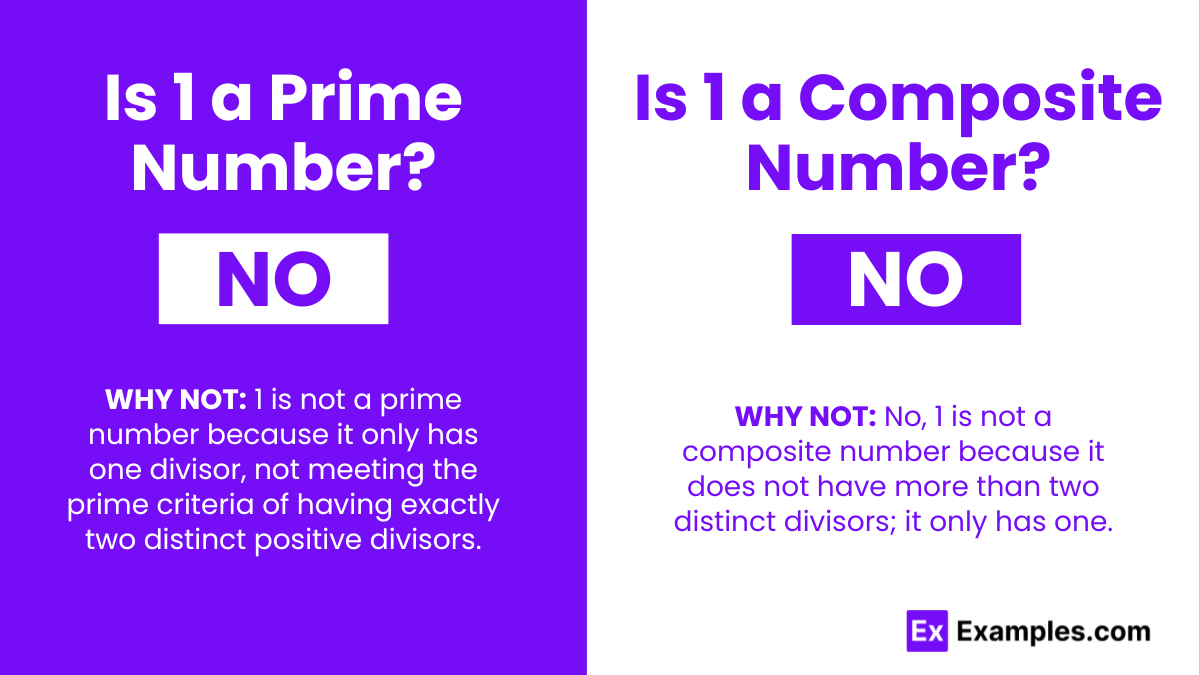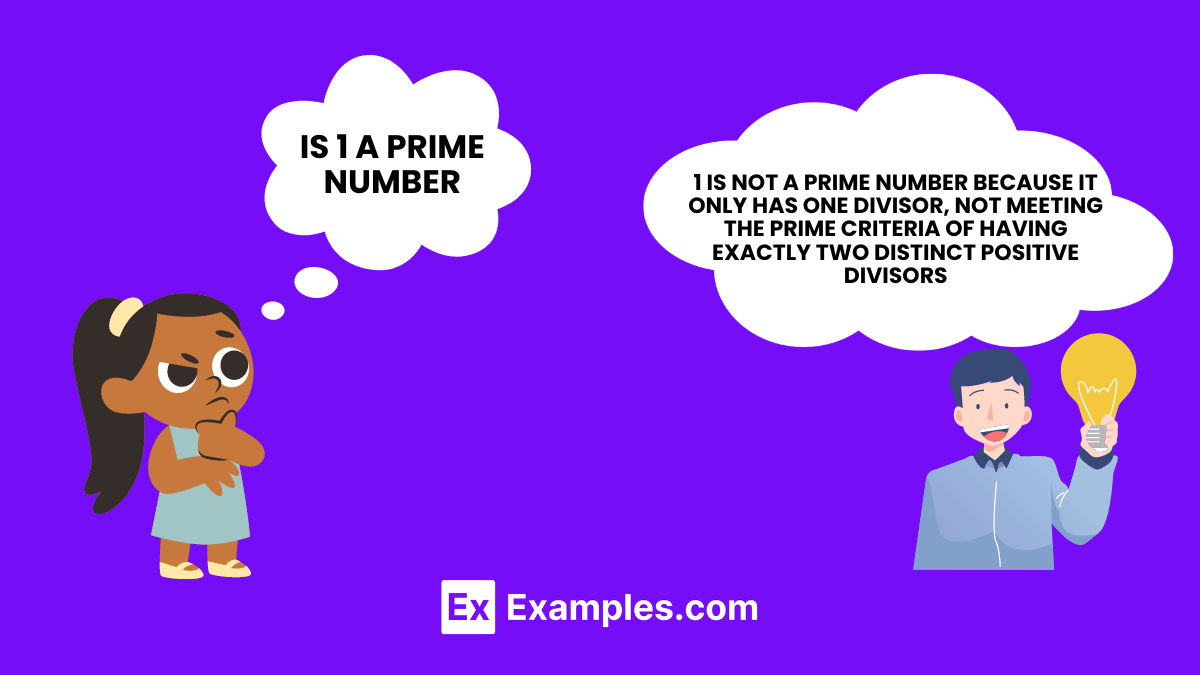Is 1 a prime number?
Yes
No
Sometimes
Not sure


NO – 1 is not a Prime Number
Why not: 1 is not a prime number because it only has one divisor, not meeting the prime criteria of having exactly two distinct positive divisors.

NO – 1 is not a Composite Number
Why not: No, 1 is not a composite number because it does not have more than two distinct divisors; it only has one.
To determine the classification of the number 1, it’s essential to understand that it neither fits the criteria for prime nor composite, uniquely standing as a unit (neither prime nor composite).
| Property | Answer |
|---|---|
| Is 1 a prime number? | No |
| Is 1 a composite number? | No |
| Is 1 a perfect square? | Yes |
| Factors of 1 | 1 |
| Multiples of 1 | 1, 2, 3, 4, 5, 6, 7, 8, 9, 10 |
| Cube Root of 1 | 1 |
| Square of 1 | 1 |
| Square Root of 1 | 1 |
| Is 1 a Perfect Square? | Yes |
| Is 1 a Perfect Cube? | Yes |
| Is 1 a Irrational number | No |
| Is 1 a Rational number | Yes |
| Is 1 a Real number | Yes |
| Is 1 a Integer | Yes |
| Is 1 a Natural number | Yes |
| Is 1 a Whole number | Yes |
| Is 1 a Even or odd number | No (1 is an odd number) |
| Is 1 a Ordinal number | Yes |
| Is 1 a Complex number | Yes |
1 holds a unique position in the number system. It is neither prime nor composite. Composite numbers are defined as integers that have more than two positive divisors. Since 1 does not fit the definition of a prime number nor does it have more than two divisors, it occupies its own category. This special status underscores the importance of 1 in mathematical operations and theories, serving as the multiplicative identity in algebraic structures.
1. Why is 1 not considered a prime number?
1 is not considered a prime number because prime numbers are defined as having exactly two distinct positive divisors: 1 and the number itself. Since 1 only has one divisor (itself), it does not meet this criterion.
2. Can 1 be classified as a composite number?
No, 1 cannot be classified as a composite number. Composite numbers are defined as having more than two divisors. Since 1 has only one divisor, it does not fit the definition of a composite number either.
3. What category does the number 1 fall into if it’s neither prime nor composite?
The number 1 is often categorized as a unit. In number theory, a unit is an element that has a multiplicative inverse in a given set of numbers.
4. Why was 1 considered a prime number in the past?
Historically, some definitions of prime numbers included 1, mainly due to a less strict interpretation of primality. Over time, mathematicians agreed to exclude 1 to maintain a consistent and useful definition of prime numbers.
5. Can 1 be used to create prime numbers?
A: While 1 itself is not prime, it is involved in the generation and testing of primes in number theory.
1 is not classified as a prime number. By definition, a prime number is a natural number greater than 1 that has no positive divisors other than 1 and itself. The number 1 only has one positive divisor (1 itself), which does not satisfy the prime number criterion of having exactly two distinct positive divisors. This distinction is crucial in the field of mathematics as it preserves the fundamental theorem of arithmetic, ensuring that every number greater than 1 has a unique prime factorization. Understanding that 1 is not a prime number helps maintain the integrity of number theory and its applications across various branches of mathematics.
Text prompt
Add Tone
Why is 1 not a Prime Number
1 is Neither Prime nor Composite
Is 1 a prime number?
Yes
No
Sometimes
Not sure
Is 1 a composite number?
Yes
No
Sometimes
Not sure
Which of the following best describes the number 1?
Prime
Composite
Neither
Both
How many positive divisors does the number 1 have?
0
1
2
3
Which statement is true about the number 1?
1 is a prime number
1 is a composite number
1 is both prime and composite
1 is neither prime nor composite
Why is 1 not considered a prime number?
It has two divisors
It has more than two divisors
It has only one divisor
It has no divisors
Can the number 1 be classified as a composite number?
Yes, because it has more than two divisors
No, because it has only one divisor
Sometimes, depending on context
Not sure
Which number is neither prime nor composite?
1
2
3
4
What makes a number a prime number?
Having one divisor
Having exactly two distinct divisors
Having more than two divisors
Being even
Is the statement "1 is a prime number" true or false?
True
False
Sometimes true
Not sure
Before you leave, take our quick quiz to enhance your learning!

